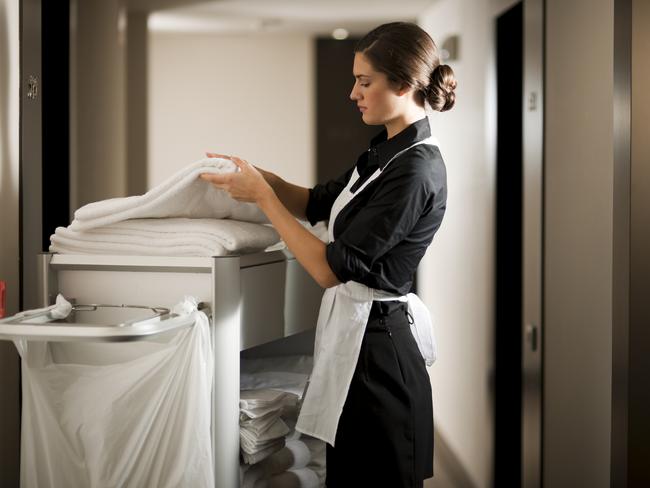Things you may not know about hotel rooms, but should
A HOTEL expert has revealed in cringe-worthy detail what really goes on inside the room before your arrival. You’ll never look at a luggage rack the same way again.
IT’S the subject of perpetual fascination: What really goes on inside that hotel room before your arrival?
Industry expert Michael Forrest Jones, from the hotel development and operating company the Beechmont Hotels Corporation, has spilled the beans in somewhat cringe-worthy detail after being asked on Quora: “What are the things we don’t know about hotel rooms?”
Here are some of his top tips but be warned, you’ll never look at a luggage rack or hand towel the same way again.
1. Don’t use the luggage rack
If your room has a luggage rack, and it’s the nice, upscale one with wooden frame rather than the ‘cheap’ extruded aluminium frame — don’t use it. After checking the bathroom floor to see that it appears clean, open your bag there. It’s safer.
That’s because bedbugs love wood (check this out) but don’t like tiles. And they don’t come from nasty people, they come from baggage that’s been in nasty places so could pop up even in nice rooms.
So put the items you plan to take from your bags on other pieces of furniture, and close the bag.
Take note that when bedbugs are not feeding on someone’s body, they like to hide out in the fluting on a mattress. If the room or the hotel is questionable, do a thorough check for bedbugs.

2. Avoid using the comforter or blanket
Take the comforter off the bed and toss it aside. If you don’t need the blanket for warmth, do the same with it. If you do use the blanket, keep the sheet between it and your body.
Anything that comes in contact with any large expanses of the previous guests’ bare skin should be taken out and laundered every time the room is made, but it isn’t always, especially in cheaper hotels.
And more upscale bed and breakfasts and boutique operations don’t rate the benefit of the doubt, either. Hotels are getting away from comforters (at least if they’re any colour other than white): they don’t like to have to launder them after each guest, and those hotels that don’t wash them each time are falling into disrepute for not doing so.
Blankets are here to stay, however, and nobody really wants to see them go. But some hotels are still hesitant about washing them every day if they think they can get out of it (e.g., unless a visible stain appears — and sometimes those get missed.)
3. The hand towel is out of your worst nightmares
*TMI alert — Here’s a gross-out story for you (hotel housekeeping stories can frequently be that way), so you might want to stop here*
Years ago when I first moved from hourly help to management, part of the process was that I got to help out with all the different departments of the hotel and learn how they work (I’d been a maintenance guy one summer in high school, and in a few part-time gigs since, so I had a head start there).
So one day, when the housekeepers were shorthanded and I had to help them out, I got to run ahead of them with a laundry cart, to all the vacated rooms, and ‘pull linen’ for them.
My job was to strip the beds and put all the linen in a pillowcase. I’d then go into the bath and gather all the towels and put all that in another pillowcase.
I’d toss both into a laundry cart and move on to the next room, saving the housekeepers five minutes per room plus however much time they’d spend running back and forth, carting the stuff to the laundry.
Oh — and wear rubber gloves for this job. I did that day, but it was still an eye-opening experience. I learned to never, ever touch a hand towel in a cheap hotel — or in any hotel unless you have the confidence in the laundry operation of that particular hotel that can only come from insider knowledge.
You know where you almost always find a hand towel in any recently-vacated hotel room that was occupied by a guy? On the floor ... next to the bed ... about halfway down, maybe a little toward the foot of the bed. Same spot in the floor, next to almost every bed occupied by a man, in every room.
And this is usually true whether he slept alone, or whether a couple occupied the bed, I’ll leave the rest to your imagination.
4. Look out
Check the peephole in your door. If it’s damaged or it has been tampered with, ask for a different room.
The only thing particularly newsworthy about the violation of ESPN’s Erin Andrews by a stalker in 2008 was that it happened to someone as famous as her (whose name and nude body, sadly, is now forever associated with hotel room peepholes after footage taken by the man through the peephole went viral).

Now, while it’s not an everyday occurrence — it’s still a not uncommon one. So how do you protect yourself?
After you check your peephole to make sure it’s not damaged, missing or tampered with, find a piece of paper (there should be some on the desk or nightstand in your room), tear off a strip of it, roll it up and twist it until it’s about the size of a cigarette butt, and ‘plug’ it in the peephole (Not too deep: you’ll have to gouge it out of there, and you’ll want to be able to pull it out yourself if someone knocks on the door).
If you do get a knock, always check via the peephole: if you don’t see anyone there, don’t open the door — use the thumb lock and deadbolt it, and call the front desk.
If a member of the hotel staff has any business paying your room a visit, the desk clerk should know. And a good-intentioned friend showing up for a visit to your room will not stand to one side to avoid being seen through the peephole.
Anyone you see loitering about the common areas of the hotel — especially a parking lot or a corridor — could be up to good, and in any event does not need to be there. Call the front desk and ask that this person be removed. And if he isn’t removed promptly, use a different hotel the next time you’re in town. Yes, it’s potentially that serious.
I look forward to the day when I can tell you to choose only hotels where every employee who has access to guestroom keys is subjected to a complete public records background check, prior to hire, and every year or two thereafter. But for now, I can’t: it’s something I’ve only seen done by one company other than my own — and they ignore the material they get on the checks.
I believe in repentance, redemption, rehabilitation and giving someone a chance to get themself straight, but I’m not trusting that person with the means, should they so desire, to make a key to a room where you, your wife or your kids may be sleeping. At least, not until it’s been quite a few years.
SOME FINAL THOUGHTS ON HOTEL CLEANLINESS
Believe it or not, there are people in the world who love to clean. But these are frequently the exception in even a good hotel, and managers don’t help much.
Room attendants, people who scrub floors and swab toilets for a living, don’t rate highly on the socio-economic scale, they often wouldn’t take a job doing that if they can get a job doing something else.
They often don’t get a lot of respect and are paid not much more than minimum wage (some hotels in fact consider it a ‘minimum-wage job’). And they’re treated accordingly.
The housekeepers rush, they have their quota to make, they get questioned if they take more than a half-hour to make a room (or fifteen minutes to service a room occupied by a stayover guest) and some of them skip things.
At just so much more than minimum wage, you can only expect them to care a certain amount. It’s not a rewarding job. Lots of encouragement and acknowledgment is necessary to keep them from burning out.
Meanwhile, owners economise, especially in cheaper properties. They underpay the housekeepers. They rush the housekeepers. They don’t go behind the housekeepers and inspect the rooms.

They have a lot of housekeeping turnover (and new ones miss a lot of things during the time it takes them to get the hang of it). Many don’t have, or don’t use, a proper procedure for cleaning reusable items like glasses or coffeemakers.
They don’t always check — or don’t even know — the proper settings on the laundry room equipment. Hotel inspectors never inspect every room in the hotel, even with a ‘good’ brand. The owners procrastinate on deep-cleaning rooms as long as they can get away with, even when the franchise organisation rules specify an interval.
Fortunately, owners like this are in the minority, but it’s still a pretty good-sized minority, and all hotels have their weaknesses.
So, you have to remember: this is shared space that you’re sleeping in. We do what we can to be vigilant, but we can’t personally supervise every housekeeper performing every little task. Things are going to get missed, sometimes we can only hope that the thing that got missed in your room this morning won’t be noticed by you, and we’ll catch it tomorrow. The last person who occupied your room might be someone you wouldn’t care to share personal space with.
Be circumspect accordingly. As Ken Lim noted in his own answer to this question, a hotel is not a comfortable place for germaphobes.
To read some of the other answers to this question, visit Quora.
Other related questions answered on the site include:
— Why don’t hotels ask for ID when issuing a new room key?



